#waywardtravelerfart
Note
So I love the little monologue CC gives this last episode where he calls out the Brother’s ineptitude (I know I’ve beaten my dislike of them to death and that’s where we commonly disagree,) from the flawed reincarnation to the overall ‘complex.’ One thing I’ve noted is that both they and Alyx left their respective temporary homes off worse than they found them, but like Salem, it’s dubious if Alyx learned anything. Which one do you think is the better parallel?
Hi!
Mmmm I am not sure we are meant to read Alyx as a parallel to Salem or the Gods as for now. She may be of course (Salem especially) since everyone foils everyone in RWBY.
As for now, though, I think the story wants us to focus on Ruby and Neo especially as linked to Alyx, rather than any of the characters who did not fall!
If you have some other idea, feel free to share it though!
(Also, I do think the Gods are dumb. I am also not that much interested in discussing their dumbassery, though :''') )
Thank you for the ask!
8 notes
·
View notes
Note
Hopefully the two expectations of Redemption and reformation are synthesized into (at least) most people accepting that Shiggy was kinda right.
Well, that might be a big stretch. Why? Because, let’s be honest: people still have doubts about whether Dabi’s broadcast is somehow true (notwithstanding that Endeavour himself confirmed it to be true in the press conference). Look at the reactions of the public at large; they are all distrustful, incredulous, taken aback (the right panel has two different translations, but the gist is the same).

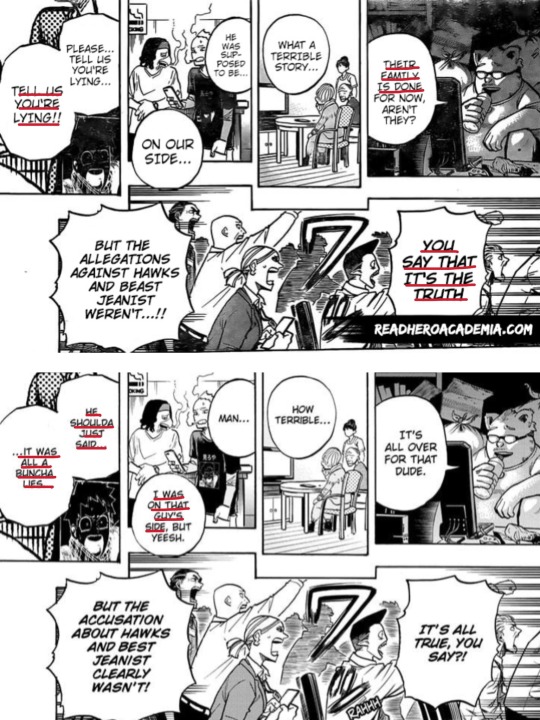
And here we’re talking about Endeavour, who was certainly not the most loved hero out there. And yet, his status as hero was more than enough for people to doubt Dabi’s truth - first of all because he is a villain. And this comes right into Shigaraki’s narrative: apart from Midoriya, who had to personally see what was hiding inside Tomura (his past kid self desperately waiting for anyone to look at him and offer him the helping hand he yearned for but did not dare to ask) (and even that, happened in chapter 305, mind you), do you think there will be anyone else able to see past the screen of ‘deadliest villain’ the world has seen?
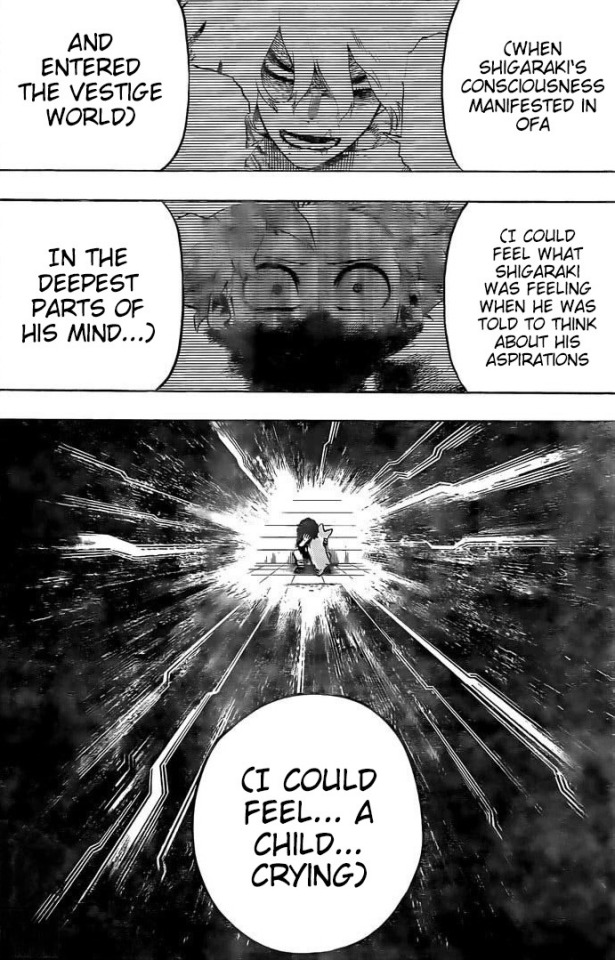

The answer is clearly no one (except for maybe the kids of 1A and 1B, and a few other personalities like Aizawa - and even about that I am not quite sure). Therefore, taking his discourse at face value will be very difficult, especially from a perspective of the civilians. What Tomura has been preaching for a long time has fallen on deaf ears, because of the exact thing he says: because no one had a vested interest in seeking of trying to understand the gap between heroes and villains and therefore, their opposing point of views have been translated into ‘good’ and ‘evil’, ‘right’ and ‘wrong’, ‘hero’ and ‘villain’.
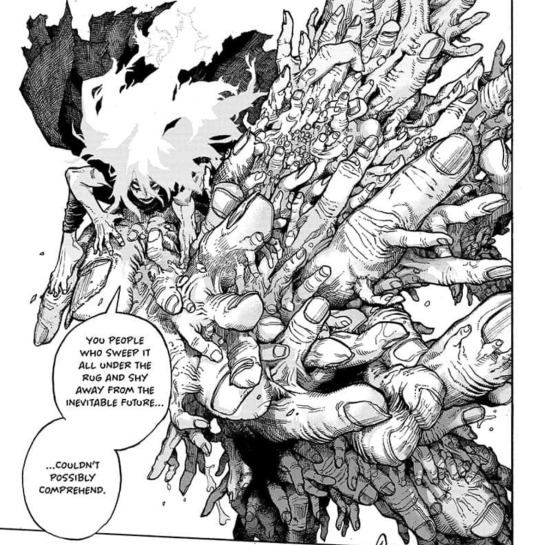
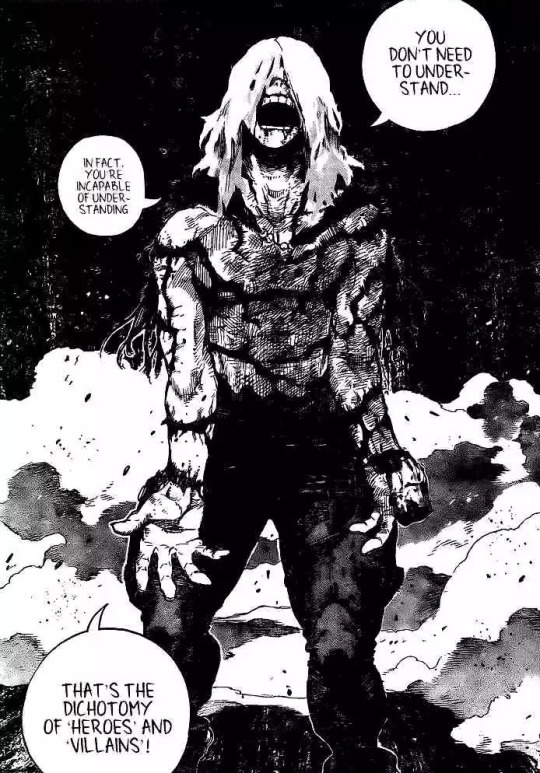
The prejudice has long taken root, and therefore admitting to mistakes which are the foundation of the entire society (the thing that in the end Shigaraki wants to destroy, but society is made up by individuals, and the fastest way to destroy a status quo is to destroy those who uphold it) will be a serious challenge. However, while maybe not in this way (admitting that Shigaraki was right, at least not everyone), society will have to face its shortcomings and admit that there is rotten in it and that it had to change. But I seriously doubt people will outrightly accept that Tomura was right; that would mean revert the entire order of society and build a new base for it, which certainly is needed and not far-fetched, but will also likely take a lot of time and effort, and there certainly will be people who will be unable to admit it, unless of course this idea is not accepted as a villain’s truth, but a universal one (but then again, in order for this to happen, someone else would have to accept and preach the idea - but this is another story). It’s certainly sad, but that is how society works, and BNHA’s hero-riddled one is not an exception.
#:sba#bnha#mha#boku no hero academia#sunn answers#waywardtravelerfart#bnha spoilers#shigaraki tomura#shimura tenko#midoriya izuku#deku and shigaraki#endeavour#dabi#anti bnha hero society
35 notes
·
View notes
Note
So if the Spring vault had a summer vibe, and the winter vault had a spring vibe....does that mean the Fall vault, for the crown of choice, will give us a snowfall for the climax of RWBY, just like the Red trailer?
That is an absolutely fantastic idea!
106 notes
·
View notes
Text
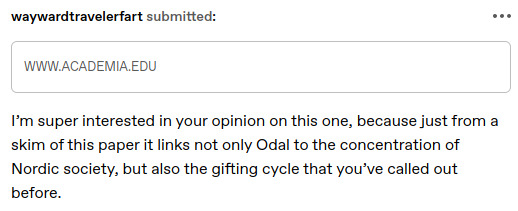
Tumblr keeps giving me an error when I try to post this and I don't know what I'm doing wrong so I'm just going to copy/paste.
@waywardtravelerfart submitted:
https://www.academia.edu/389145/Decentralized_Complexity_the_Case_of_Bronze_Age_Northern_Europe?email_work_card=title
I’m super interested in your opinion on this one, because just from a skim of this paper it links not only Odal to the concentration of Nordic society, but also the gifting cycle that you’ve called out before.
Very interesting paper, I hadn't read it before. I feel like I need to read some of the things it cites before feeling like I have any sort of full response but I like the level of granular detail that usually isn't included in descriptions of the Nordic Bronze Age. Page 188 is a trip. I think this is good reading for people who seem to think of the past as being basically unchanging until something happens that disrupts that. Sorry that I took so long to read it and have so little to say right now but I'm gonna want to sit with it a bit before I figure out what it means for other stuff I've written before. I also just recently listened to the audiobook of Debt: the First 5000 Years by David Graeber which was a little too much to take in all at once and this is pinging things I vaguely remember but I'm gonna need another listen.
Great bibliography, too. Thanks for sharing.
29 notes
·
View notes
Note
And honestly what sucks for me as not only a fan of the meme master twice, but also someone who identifies with his psychosocially induced poverty, is that all it would’ve taken to save him was literally having a package deal for his family. That’s all. He proved himself to not be a scab deep down and was still narratively punished for it. I’m sure Hori may not mean it this way but the “all men are not born equal” thesis just feels like something you want to disprove eventually. Having the most relatable problems to people in poverty, just not having “luck,” be one of the stories that gets picked off before the final act to not be concluded just feels like a middle finger to many not-so-well-off people who probably came to this series for wish fulfillment. Maybe I just wanted more Twice’s personality in the series and to see what his quirk really could’ve done but I just wanted to get this off my chest to someone who could understand, whether it’s answered publicly or not would really be appreciated.
hey! if you sent another ask before this one, I never received it. But I’m gonna give you a brief answer to the best of my abilities nonetheless.
I’m not sure what you mean by the word “scab” referred to Twice (forgive me, I’m not a native speaker so I’m going off urban dictionary). Did you maybe mean someone who betrays fellow workers for personal interest? The unionized context of the definition is throwing me off a little. If that was the meaning you had in mind, I wouldn’t have used this term, personally. I can see the mental association of hero society with a soulless capitalist corporate business, but imho that comparison doesn’t do justice to what the League is. They’re not minimum wage employees struggling to survive in a system that exploits their labour. They’re not working class to begin with, they’re outcasts. If you wanna draw a real life comparison to politics, which for the record is not something I’m super comfortable doing in my meta, I’d say they’re more akin to the immigrants of bnha society. Everyone pretends they don’t exist, they don’t have rights, they’re branded as criminals for their dna, and no one cares about their human rights violations so long as they keep existing in the margins where people don’t have to look at them.
Aaaaanyway. that got a little too real for a reply on a fictional manga about superpowered individuals.
Your point was that all it took for Twice to accept Hawks’ offer was for Hawks to extend that same offer to the rest of the League. But I’ll raise you: the point here is exactly that Hawks didn’t. That he wouldn’t, under any circumstance. Cause Hawks’ offer wasn’t motivated by heroic selflessness, but only personal bias. He wanted to save Jin because he liked him. Because he saw him as a good person. Not because he believes in rehabilitation. Not because he believes that villains can have a fresh start. It was because he never bunched Twice with the rest of the “villains” in the league in the first place. Hawks divides the world into good and bad people and he decided Jin was one of the good guys, entirely missing the point that good guys can be villains, too, when villainy is a label slapped so liberally onto people who don’t fit in their society.
as for the topic of poverty and of the “all men are not born equal” core theme of the series... idk, part of me thinks that at least the latter might get explored some more in the near future, but the other part of me... well, let’s call it the realistic part of me, knows Horikoshi’s track record. There are a lot of things that he introduced in the story never to develop them again and I think those two things you mentioned are the best examples. The topic of poverty in particular is one that deserved more narrative focus imho because Horikoshi went extra out of his way to almost exclusively associate poverty with villainy (think of how economic instability and homelessness are key factors in most villain backstories we’ve been given so far), but then at the same time he almost challenged that idea with Ochako and Hawks, only to never explore it at all. We were told that Ochako wanted to be a hero to help her parents financially, and then the further the story goes on, the more the topic of their poverty and her selfishness kinda... disappeared? It was entirely forgotten about. And then Hawks, whose parents lived in a shack and were criminals (well, one of them was, the other was just an accomplice), completely flips the narrative of poverty>villainy by being sold to the heroes, and yet there’s never any narrative focus on how a government institution quite literally preyed on the lowest social class in order to get away with basically child trafficking. It never gets explored.
So at this point I’m just like... *shrug emoji* at certain things because I know that Horikoshi is a wildly incosistent author. Honestly this manga is not the best media to look for good representation of minorities and/or wish fulfillment. Horikoshi has repeatedly criminalized minorities and given way too much slack to oppressors so tbh I’d be very careful about seeking comfort from this series without questioning its sometimes less than ideal messages
27 notes
·
View notes
Note
Where exactly was Mr. Foxhead named Brand? He’s always fascinated over the other lieutenants but Googling him turns up nothing but general merchandise for the fandom.
Aha, well, my best guess is that he was first named Brand in whatever OneNote file I was using to brainstorm the Spinner+Trumpet fic in which he has a sizeable appearance in the first half.
That is to say, he hasn’t been named officially; only two (three if we assume “Red” is a nickname rather than a regiment nod) of the twenty-one advisors have been. But I’ve made up names for an additional seven of them over the course of writing fanfic about the MLA, so I often just use those names when I’m writing meta about the advisor cast, who fascinate me. I named Brand after his katana—brand is an archaic Old English word for sword, so it suits my taste for MLA code names that have a slightly esoteric feel.
As for someone who isn’t me using it, the person who sent me the recently posted ask about him has been graciously sending asks about the advisors for some time now, so I think they just used my name for him since I so often use it myself. I'm more than happy to roll with it in that case, though I also nickname him Katana Advisor, Business Shark, and Pinstripe Greninja.
Sorry for any confusion! I largely consider the advisors Free Real Estate until Horikoshi does anything with them, and I love the MLA, so I’ve done a lot of thinking about them.
(Seriously, why does Mr. Foxhead, number three advisor for the only full-throated quirk supremacist of the named MLA cast, fight with a katana? Why does he fight with a weapon of any kind? What is his quirk, such that it’s not the first thing we see him going for in battle? I need answers to these questions and will make them up in I have to.)
Thanks for the ask, @waywardtravelerfart! If you want to read the fic Brand's in, by the way, it's In (Un)Common Cause, linked at the top here.
#bnha#plf advisors#I would be proud to be the source of word-of-mouth fanon about the mla cast believe me#but it's just a fic name#stillness answers#waywardtravelerfart
4 notes
·
View notes
Note
I don’t know if you’ve seen a lot of the recent discourse surrounding Omni Man, but a lot of it reminds me of my feelings about the RWBY brothers around the premiere of the Lost Fable. Like a sense of practical misotheism, with a feelings that eventually led me too gnosticism. Do you see any potential hints or themes of gnosticism showing up in RWBY, since we’ve seen plenty of Alchemy, and they’ve been linked in the past?
I haven’t seen this!
But re: RWBY.... possibly, yes, since alchemy is very tied to gnosticism. If so I’d expect to see this explored a bit next season given being between worlds and all that. However, while RWBY might take a gnostic-ish approach to the gods.... RWBY actually seems to be countering gnosticism in some ways (one can argue how successful they’re doing so, of course). The physical does matter. The soul has a literal physical presence, which is... not super in line with gnosticism in its purest forms. There’s nuance to RWBY’s portrayal of the physical vs the spiritual, and I personally really like that.
For people who aren’t familiar, gnosticism in its strictest sense descends from Hermeticism and is like...body/physical bad, spirit good. The irony is it is well-known for being considered a heresy among the early Christian church (because gnostic Christians would teach that Jesus wasn’t really human but instead a spiritual entity) but the white evangelical American church today pretty much practices this in teaching that what happens to your body doesn’t matter but your spirit does. In traditional Christian doctrine (a lot of the New Testament was written to counter gnosticism), it’s much more nuanced: death is not the end, but the physical is a reflection of the spiritual and does matter. I’m not a gnostic personally; I’m a Christian, but insofar as stories go I like, really don’t care lol.
Anyways, in alchemy, gnosticism often takes the form of the idea of the heart and mind or soul/spirit leaving the body behind. For example, Harry and Hermione often leave Ron behind in key moments in the books, I expect Jon and Daenerys to get together romantically but the third Head of the Dragon, Tyrion, will not get together with them in a romantic sense; Claire and Jim in Trollhunters leave together in the end while the body of their trio, Toby, stays behind; Gollum falls into the fires of Mount Doom while Frodo and Sam are rescued, etc, etc, etc.
My Emerald Tablet meta touches a bit on the physical in RWBY: the spiritual and physical are deeply linked in ways that are uncommon in gnostic portrayals and honestly in alchemy as well. I’m intrigued to see where this goes, if anywhere.
22 notes
·
View notes
Note
Ohara just did a video on Midoriya just when a bunch of the fandom is really finding him boring. Ohara, who usually covers One Piece vid points may seem generalized but what do you think?
I've watched a bunch of Ohara's videos on One Piece and I generally like his takes, but I've learned to be wary of YouTubers in regards to BNHA, because of how they tend to view the LoV/Endvr storylines.
But I was happy to find that his takes on BNHA are good, too, so thank you for recommending. Love the way he pointed out that hero society is flawed, as it creates the very villains it scapegoats as the cause of every conflict. And I liked that part of his thesis in this video was basically saying that yeah, a crucial part of Midoriya's character arc is coming to terms with the fact that the heroes he idolized to a fanatical degree are not perfect and should be viewed critically, both as individuals and a system.
On the whole, he does a good job of outlining both the virtues and flaws of the character. Midoriya is not a character I'm personally invested in, but I definitely see his potential, and agree with the main point in Ohara's video -- Midoriya will complete his character arc by saving Shigaraki, which will thus make him a true hero.
Most of my gripes with him aren't that he is boring, per se -- unsurprisingly, it's the writing, which underutilizes the potential he has and doesn't make me all that invested in him. His growth is slow-going, as he's only just begun to realize that heroes might not be unquestionably good and that villains can have understandable reasons for their actions, which is frustrating. We're 300 chapters into the story, after all, and it's not like he's a stranger to these flaws since he grew up without a quirk and was told he couldn't be hero simply because of that. These flaws become even more clear through his eventual interactions with characters like Shouto, Eri, Stain, etc.
Also unsurprisingly, I hate that he's still working with heroes like Endvr, Hox, and BJ post-war arc. I could maybe buy that during the pre-war era, but in post-war BNHA, Midoriya choosing to work alongside Hox -- who, as a hero, literally killed a man in cold blood and faced no repercussions -- and Endvr -- who he was already aware had abused his entire family, but Dabi made it explicit just how gruesome he was for the sake of his ambition, and what lengths it drove his own son to -- while simultaneously making the declaration that he wants to understand the villains and save them if possible? Hmm. It doesn't add up.
Here's a link to the video if anyone's interested in watching.
13 notes
·
View notes
Note
🔥 Old Gods?
I don’t think they’re just like. “uwu peaceful tree spirits”. I think that there’s some fucked up blood sacrifice and horror there too. Nature is powerful and terrifying and beautiful and destructive and healing! It brings both life and death! I think the Old Gods are all of nature, not just one aspect or another.
13 notes
·
View notes
Note
I’m pretty sure there have been several other people who’ve brought up Dabi’s quasi-racism as well as that of the Todoroki’s as a whole, even having a meme about it, so I have a hard time comprehending why anyones targeting you specifically over this :/ :P
hello! Thanks for the ask!
I think it might be because I’ve been the most harsh to Dabi and admittedly insistent-to-point-of-being-annoying in my meta (and making huge long taking-up-much-space meta posts about it - sorry!) about it + I’m considered a popular blog (is 3000+ followers popular? I suspect a good quarter of that are probably porn bots - but if even porn bots reblog my post, I guess my reach is still there???) so these opinions get amplified. :/
Also I know my jokes like editing Dabi out of picture existence are awful, a blight upon the LoV fandom land, but I can’t help being a clown. 🤡😔
I haven’t seen the meme, but if you would like to share, I would not mind. 👀
In any case, I guess I rather have the target be me than other people getting tormented, so maybe it’s not the worse thing overall! Undeniably, this has spiced up my days.
Thanks again! i hope you have a wonderful halloween!
5 notes
·
View notes
Note
Quickly!! (If you want to and have time too) Arya meets the sand snakes!! Or how about Arya in dornish clothes! Please I love your art so much and I just wanted you to know that ❤️💗
I definitely need to draw Arya with the Sand Snakes, she’d love them so much! But I don’t have time to draw all of them, so have a little doodle of Elia braiding Arya’s hair.
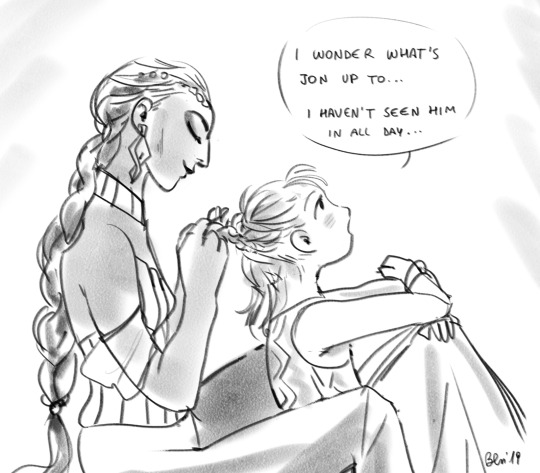
Also, @waywardtravelerfart asked to draw Arianne hitting on Jon and I loved the idea haha

#asoiaf#a song of ice and fire#jon snow#arya stark#arianne martell#elia sand#my art#fanart#doodles#ask#jessicagreyjoy#waywardtravelerfart#thank you!!!!
305 notes
·
View notes
Text
Your Power...Your Theme
This post is born because of @waywardtravelerfart asking about a comparison between Semblances (Rwby) and Quirks (BNHA).
In general, I am not a hardcore BNHA fan, though, so I decided to drag other magic systems in this comparison.
So, I will be comparing...
1) Semblances:
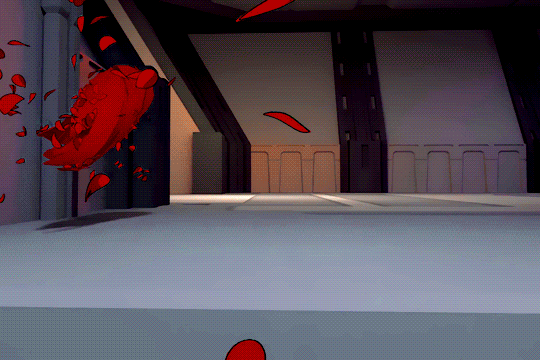
2) Quirks:
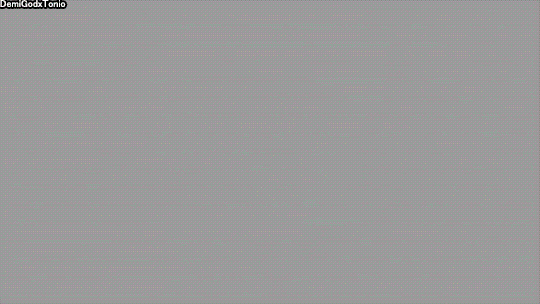
3) Nen (HxH):
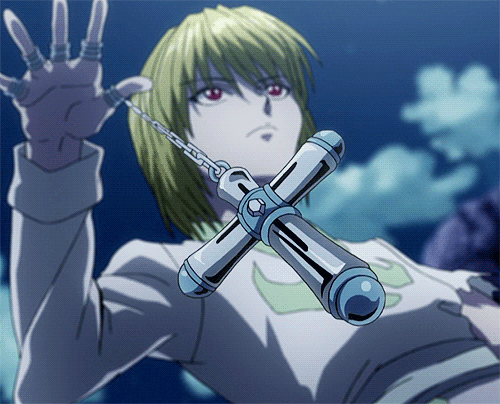
4) Abilities (BSD):
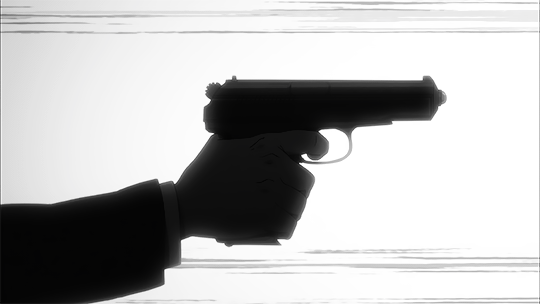
5) Magic (WHA):
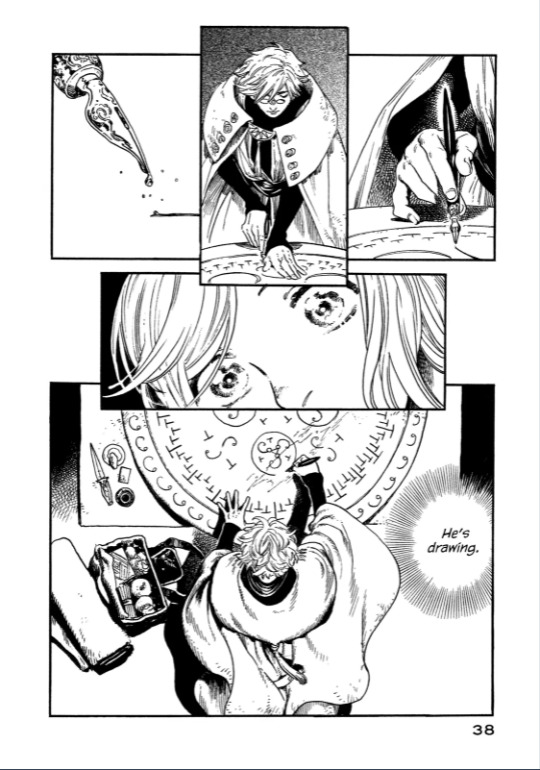
Body and Soul
1) & 3)
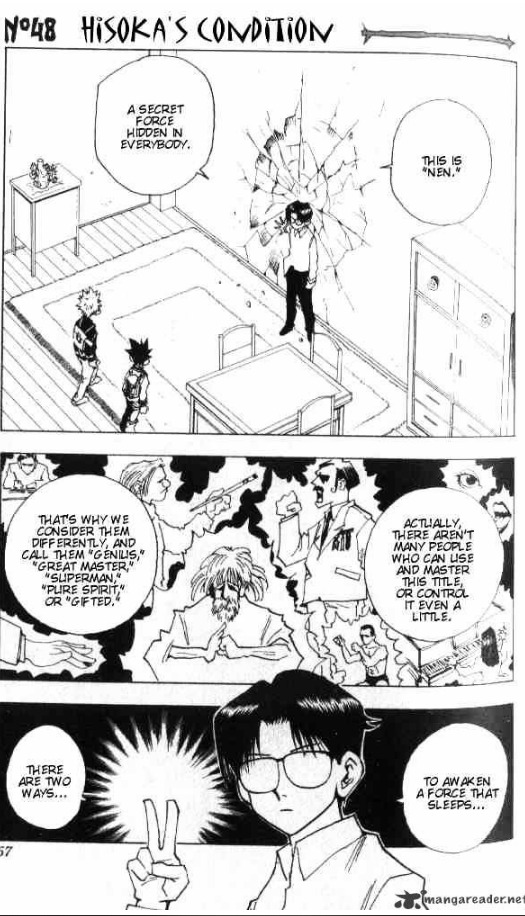
Pyrrha: Aura is the manifestation of our soul. It bears our burdens and shields our hearts. Have you ever felt you were being watched without knowing that someone was there? With practice, our Aura can be our shield. Everyone has it, even animals.
Nen and Semblances are very similar ideas. Both have their root in the concept of aura aka life force and are trained through specific exercises that are based on martial arts.
More importantly, they are manifestations of a person’s soul.
This is why in both series they are linked to one’s individuality:
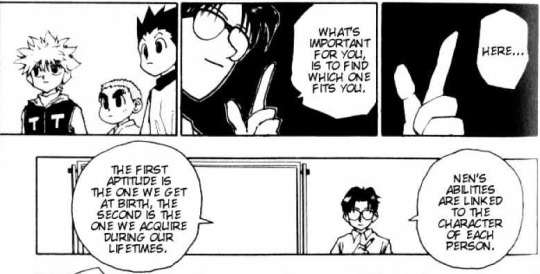
Ren: A common philosophy is that a warrior’s Semblance is a part of who they are.
And both Nen and Semblances grow and evolve with the person.
At the same time, both stories focus not only on the soul, but also on the body.
In HxH Gon and Killua must train their bodies just as much as their nen. No matter how much stronger their auras become, they would still be left defenseless if they forget about basic training and if they do not take care of their bodies.
Similarly, Huntsmen and Huntresses in Rwby have both Semblances and Weapons:
By baring your soul outward as a force, you can deflect harm. All of our tools and equipment are conduits for Aura. You protect yourself and your soul when fighting.
Weapons are linked to personalities just like Semblances are:
Ruby: Just weapons? They’re an extension of ourselves! They’re a part of us! Oh, they’re so cool.
It is only through the combination of weapons and semblances that one becomes strong and whole.
In order to experience humanity to its fullest, one needs both a soul:
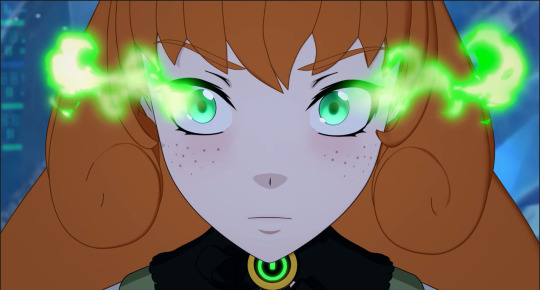
And a body:
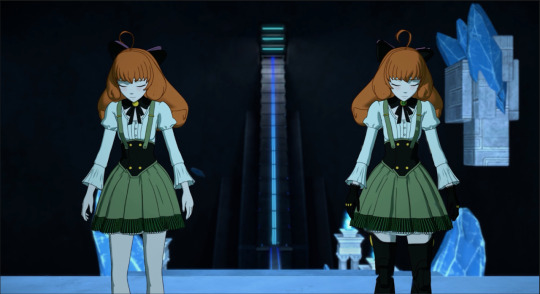
In short, Semblances and Nen are representative of the Soul. They are a physical projection of it. Moreover, they need to be completed by the Body to properly work.
4)
BSD abilities are similar because they clearly symbolize characters’ coping mechanisms.
They are linked to people’s personalities and their effects are highly variegated and impossible to explain through biology alone (for example, a character is able to materialize a whole room in another dimension).
At the same time, they seem to have some physical properties.
For example, it is possible to create artificial abilities and to implant them into people. The process has yet to be properly explained, though.
This can be compared to the research on aura made in Rwby.
That said, this specific research is framed negatively by the narrative because it is an attempt to control what it should not be (a person’s soul).
Similary, in BSD, such experiments are criticized as well because they violate human rights and are an attempt to weaponize abilities, which is an ongoing topic explored by the story.
2)
Quirks are instead framed as the result of biological evolution. This creates an interesting inversion compared to the other stories. Quirks are not simply physical representations of a character’s psychology, but they are a part of the reason why that character develops a specific coping mechanism.
Toga is attracted to blood because her Quirk is about drinking blood, so she naturally likes it.
Shigaraki’s destruction traumatizes him because it leads to his family’s death.
Touya’s weak constitution makes his power difficult to use, hence he develops self-hurting tendencies.
5)
Finally, Magic in WHA is something that exists outside the characters.
It is not something people are born with, but an art they can master through study and dedication.
Its origin is still unknown, but it is explained that it works thanks to specific materials:
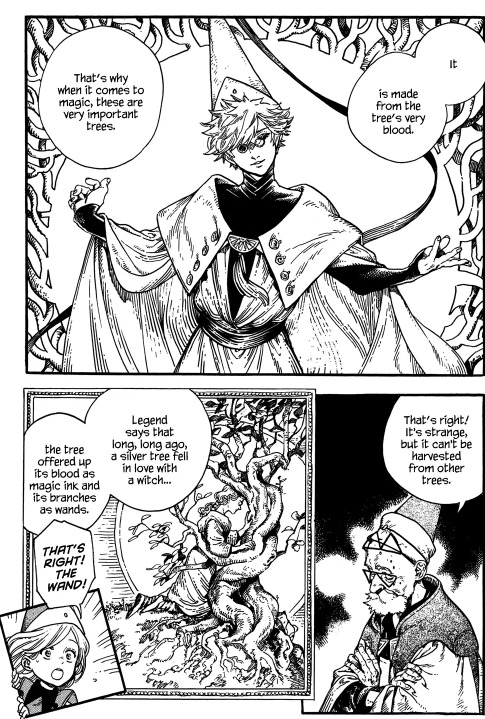
And even human blood can be used to strengthen it:
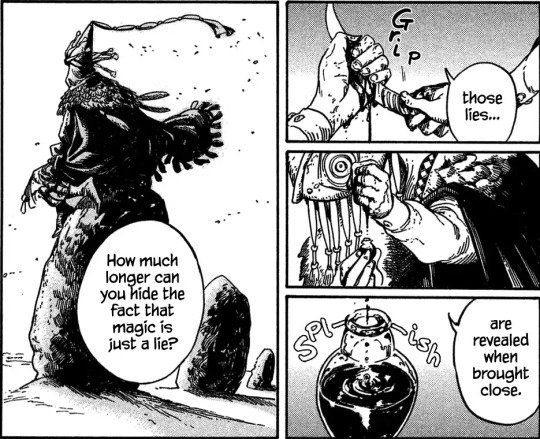
In short, Magic is a human art that makes use of specific natural resources and a specific knowledge to create several effects. In a sense, its logic is similar to both art and programming. It is similar to art because the witches need to exercise on drawing and to be creative on their approaches to things. It is similar to programming because they must use what is basically a specific language made of symbols to create different effects.
So, Magic is not linked to a person’s soul in the way other magical systems are, but a character’s personality still emerges from the kind of magic they specialize in. This is something unavoiable... after all this is how personality works in real life as well... we all have different approaches to problems and beliefs that will emerge in our art and in our jobs.
In conclusion, all these magical systems are connected in different ways to characters’ personalities, to their flaws and to their symbolic roles in the narrative.
In these metas, there are some examples of how this happens for HxH, Rwby, BSD and WHA.
Power and Privilege
3) & 5)
Nen and Magic are similar:
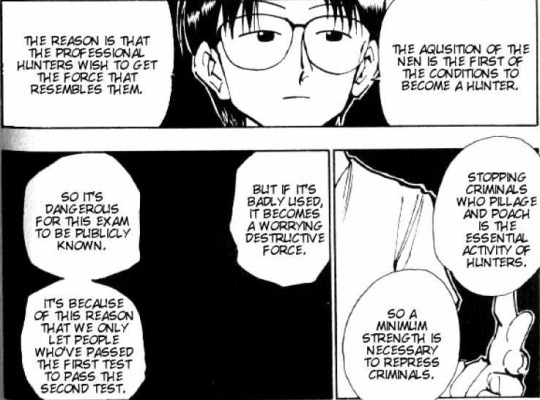
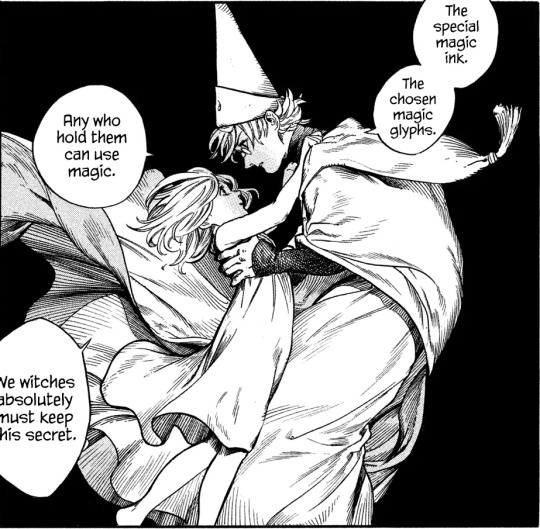
With enough training, both powers can be used by everyone.
However, both HxH society and WHA society choose to keep them secret because the damage that could come from sharing this knowledge is potentially devastating.
That said, both stories also show how there is hypocrisy behind this stance.
HxH does so in an indirect way.
Nen is supposed to be secret, so that dangerous people can’t use its power for wrong reasons.
However, many hunters are not really moral people. If anything many are violent and ready to kill. The exam itself encourages these tendencies since it does not punish murderers. Moreover, it turns out that very dangerous people already know about nen:
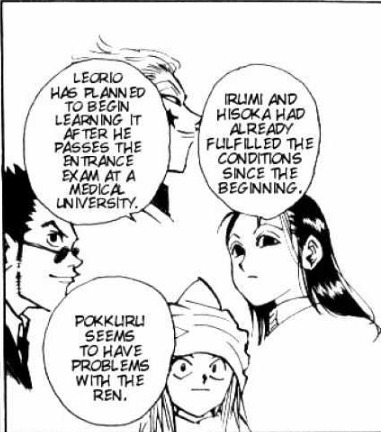
WHA explores this theme more directly:
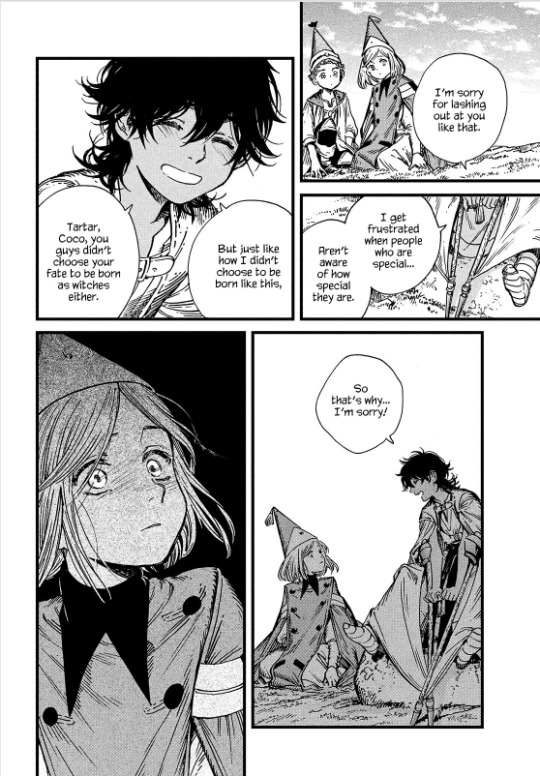
The secret behind magic creates inequality. Magic could be used to help much more people, but it is limited by the law that imposes witches to keep the secret and forbids them from using magic to heal.
The result is an unjust society and a paradox. Isn’t there another way to use magic that it is less elitarian?
2) Similarly, quirks create inequality in BNHA. However, the mechanisms behind it are slightly different.
Not only people without quirks are discriminated, but also people with specific powers are considered less than others.
This happens either because the power is considered weak or lame or because it is considered a villain power.
In other words, BNHA society nurtures a simplicistic and black and white vision of quirks and people. This leads to some being discriminated for their quirks and to others being excused of everything because of their abilities.
4) In BSD, we have a similar yet partly opposite situation.
Ability users are mostly dehumanized and weaponized by society.
Basically the series explores how society makes use of its more vulnerable members and objectifies them.
So, in BSD having an ability is not really a synomim of privilege, but it is rather something that can set you apart and make you a victim of your country or your organization.
Because of this,the characters struggle to both accept their powers, but also not to be defined by it.
1) Finally, the case of RWBY is interesting because even if society is founded on privilege and inequity, semblances are not really a pivotal part of it.
It is much more common for people to be discriminated because of their bodies (like the Faunus) or their social status than for their semblances. Surely, cases like those exist, but they are not particularly explored by the story.
This might be because semblances are just one of many factors that determine a personal’s stance in society. Moreover, it is not even that clear how much common people know about semblances and aura. I would not say it is exactly a secret, especially because semblances can manifest themselves in a variety of situations. Still, it seems to me that they are mostly aknowledged and accepted by common people, but not exactly pursued or studied.
Symbolically, semblances are linked to an ancient magic that has been forgotten by people. This could tie with why some people, especially in Atlas, have been dismissive of them to an extent. Whitley dismisses his own and is not interested in developing it, while Watts is one of the few characters who fight without a semblance.
It might very well be that human technology and dust make so many different effects possible that a semblance, even if important for a warrior’s own strength and individuality, is not really the only factor that determines the place of a person in society.
In conclusion, all these power systems are linked to privilege in different ways. They are used to explore social inequality or parts of the society that are either repressed or not aknowledged.
Choices and limits
1) 2) & 4)
Quirks, Abilities, Semblances and their limits are not chosen. You are born with them and the most you can do is to try and overcome the limitations or to come up with clever ways to use your power.
You can train your Quirk, so that it becomes stronger.
When it comes to Abilities instead, characters usually must train to control what are potentially dangerous powers.
There are also abilities that help other people to control their powers and modify how these powers work. For example, there is a character whose ability is about summoning a fighting avatar. However, to do so, she needs to be called on a specific phone and it is actually the one calling that commands the avatar. Still, thanks to the influence of the above mentioned ability, she becomes able to summon the avatar at will and does not need the phone anymore.
Finally, in the case of Semblances, you need to meditate and to train your semblance, so that it can evolve. At the same time, though, semblance evolution can happen also because of specifical psychological conditions.
For example, Ren’s Tranquility both activates and evolves not because of physical training, but because of stress (the first time) and emotional growth (the second). This is fitting because his ability has mostly to do with emotions, so it is telling that it evolves as he grows emotionally rather than physically.
Ruby’s semblance is instead a physical one since she is super fast. So it is fitting that it mostly manifests and evolves with her training at using it.
Finally, when it comes to semblances, you do not really choose how they evolve and what new effects you gain. They are mostly an unconscious part of yourself that grows with you.
3) & 5)
The kind of magic you specialize in and the nen power you are gonna have are things one chooses.
To be more specific, they are influenced from one’s talents, but then they evolve according to a person’s choice.
For example, the protagonist Gon has an aura which is particularly good to strengthen things, so he chooses to use it to strengthen his punch. Moreover, he really likes Jankenpon, so he comes up with a power that uses this game. It is a technique that creates different effects depending on what he chooses to “play” (scissors, rock or paper).
Similarly, Coco is good at drawing straight lines and this makes her good with basic magic, that she uses in original ways because of her thinking outside the box. Her teacher Qifrey instead specializes in water magic because he used to be scared of water when he was little and wanted to overcome this fear.
At the same time, both nen users and witches must face limitations.
Nen has limitations that are self-imposed and decided by the users.
Magic has limitations that are imposed by society and codified through law.
Nen works with the idea that the stronger the limitation you set, the stronger will be your power. Similarly, if you sacrifice something, you can obtain a more powerful effect.
For example, another character called Kurapika creates chains with different powers. One of his chains has the limitation to only work on the members of a specific criminal group. Moreover, if Kurapika breaks this rule, he’ll lose his life. Since the sacrifice Kurapika has decided is pretty extreme, that chain is basically impossible to break.
Of course, limitations do not need to be so extreme. The protagonist’s jankenpon is limited by the fact he says out loud the name of his technique and takes time to use it (both goes against him, since it gives his opponent time to prepare). In this way the power gets stronger.
Magic is a very dangerous force, so it is prohibited to use magic on people’s bodies. This includes the idea that you can’t heal bodies directly or that you can’t change the way you look. It also forbids people from using blood to make magic stronger and to put glyphs on a person’s skin.
These limitations challenge the characters and force them to think outside the box. For example, Coco wants to save her mom who became a stone. The best way to do so is to use magic on her, but this is prohibited hence Coco keeps brainstorming about how she can do it and even thinks about breaking the law multiple times.
In conclusion, powers are often linked to the self and the degree of control and choices characters have on them is symbolic of which part of the self we are talking about.
In the case of semblances and abilities, they mirror an unconscious part.
A Quirk is a biological factor that influences one’s self instead and that everyone can try ot develop in a way they like.
Finally, nen and magic are a conscious part of the self that still mirrors unconscious tendencies.
Not only that, but abilties have limits that come from either outside the person or inside them.
POWER SYSTEMS AND THE FIVE KINDS OF CONFLICT
In stories, there are at least five types of conflict.
1) Man vs Self
2) Man vs Society
3) Man vs Man
4) Man vs Nature
5) Man vs God
The magic systems we explored are linked to at least three of these five types.
Man vs Self
Supernatural abilities are linked to a person’s interiority and personality. Often they are representative of the character’s flaw and their limits can be overcome only by the person’s growth.
Man vs Society
Power systems end up being influenced and influence fictional societies.
They can represent privilege or some wrongdoing in society itself.
Alternatively, they can be limited by society’s rules and imposed laws.
Man vs Man
It is not uncommon to have special powers used in fights. In this case, they become symbolic ways to explore characters’ relationships, themes and different value systems.
This is something that BSD, HxH and Rwby do a lot. WHA has had less fights as for now, but it is definately something that has come up and will come up more in the future. Finally, I am not too much into BNHA to comment on the series, but I would be surprised if it is not the same there as well.
In conclusion, I do not really have much to say on the onthology of powers in different narrative worlds and tbh I do not think this is really what many writers think about when they design them. I think what writers focus on is how to make interesting powers that convey a character’s personality, can be used to explore the world and give life to entertaining fights.
94 notes
·
View notes
Note
Who did the Doom-Todoroki in your header? Couldn’t find it in your art.
I have literally scoured the internet trying to find the source. I don’t know who actually made it but I do know that I got it from this post: https://doodlestation.tumblr.com/post/617878176023068672/midoriya-its-your-power-todoroki-todoroki
I am going to be changing up my header because I dont want to be taking anyone’s work without credit
5 notes
·
View notes
Note
So we both know the brother gods are dicks. The question is, how are they most likely to be dealt with? Dust? Technology that isn’t their creation, but humanity’s?
Giant Robot the size of a galaxy.
Likely by talking them down and convincing them they’re wrong. There is no victory in strength, after all.
36 notes
·
View notes
Note
Waywardtravelerfart check in from out of home: what’s our leftist damage control plan for the horned Nazi at the capitol?
You mean because of the heathen imagery? I have a bunch of thoughts.
From what I gather the guy is some kind of weird syncretic spiritual Christian and heathens have been pretty quick to point this out both as a way of distancing themselves from him and just because it’s important context generally. But I think what heathens are missing is that we’re not as unconnected to this guy as they think. While I don’t know the details of what he says or believes or where it comes from, the roots of modern heathenism include syncretic Christian mysticism, Theosophical spiritual racism, and conspiratorial occult revisionist history. The most (or at least second-most) influential author of books about rune magic (Thorsson/Flowers) is keeping alive the theories of a nationalist (Johan Bure) who thought that an order of masters of the “runic mysteries” had guided the transition from pre-Christian heathenry to Christianity such that the important parts are the same in both. We really don’t have the luxury of not knowing this stuff, and if we want to convince others that we have nothing to do with the Q-shaman we better make sure we’re auditing our own influences.
On a different note, I think it might be helpful for heathens to start thinking less in terms of “racist vs. anti-racist” and more in terms of the three-way fight between us, the fascists, and the neoliberal settler state. This is basically what I’m getting at in this post. This is playing out in a very broad way as people argue that we all have a duty to side with the state against the chuds who stormed the capitol, as if this weren’t the same security apparatus that REGULARLY funds, plans, and trains people to enact coups and put down rebellions all over the world. We can’t base our appeals for legitimacy in complicity or nonconflictuality with the settler state. The openly reactionary nationalism of the MAGA people and the neoliberal security state that has finally started taking a minimum of action against the former now that it’s politically convenient (remember, they already had the anti-terror laws they needed to stop this at any time, chose not to, and do not need more), are two different, competing but barely conflicting strategies for preserving white supremacy; both have in common ICE detention facilities, bombing hospitals, seizing Indigenous lands on behalf of corporations, the prison industrial complex, and again, I really can’t stress this enough, staging coups.
The reason this is all so important for our messaging is that when heathens actually do have a real anti-racist movement, we will be discredited in ways that are related (though, not as intensely) to the ways movements in the history of the Black radical tradition have been discredited (or, maybe the environmental movement is a better comparison). The heathen strategy for public relations has usually been to appeal to media and organizations like the SPLC, but we need to learn to speak for ourselves and not beg for approval, because then that's what informs our values and our actions. Let me put it bluntly: liberal heathen anti-racism is an appeal to not be excluded on religious grounds from the benefits of white supremacy.
All of this being said, it remains true that we have to make it clear who we are and what we stand for, vocally denounce folkish heathenry and this Q-shaman loser, because we also have to remember that there are heathens and heathen-curious people out there who aren’t white, are queer, are disabled, and are otherwise marginalized, who need to know that there are people out there that they can relate to and trust. It’s just that making ourselves deserving of that trust comes first.
Since we don’t have a real heathen antifascist, anticolonial movement (i.e. we have antifascist heathens, but no ability to coordinate action as antifascist heathens at a scale beyond the individual affinity group), the best things for heathens to do are to start building the connections to develop one, and simultaneously do work toward these ends with non-heathens. Just to be clear, when I say “coordinate action” I’m not saying that we need another national heathen org that can disseminate orders but this time make it good. I mean building relationships with people who have goals in common and working together to accomplish those goals without collapsing or undermining their unique identities and autonomy. This applies equally among heathens, and between heathens and non-heathens. I think what would be unique about heathenry in this context would be the way that our relationships of solidarity impact the way we express our religion and feed back into the continued development of heathenry. It would also establish a place for heathenry in the histories of other, non-heathen communities, and thereby make these appeals for approval from big platforms less relevant or even obsolete. Undoubtedly this would, over time, develop a wide-ranging diversity of heathen thought and expression that would make its distinction from folkish heathenry self-evident at even the most superficial observation.
89 notes
·
View notes
Note
I was thinking of asking you this even before I saw that side meta on Izuku, but I’m super interested on your opinion of what he’d do with the fuller picture on hero society, and if he’d ever go as far as going after the hero commission as villains/what it would take for him to consider that avenue. Interference from editors actually does put a lot of some fan’s criticism of Izuku as a protagonist into a greater context, socially and politically, given how right-wing japan can be.
Honestly, I doubt that Izuku is ever going as far as dismantling the current system. I’m dubious that anyone will even be allowed to, sometimes. But if there’s gonna be social change, I have a feeling that we should look more at Shigaraki, Dabi and the lov for it. At the very least, they’re gonna set in motion the first domino piece to make the heroes finally start to self-reflect.
Part of me wants to believe that Hori at some point will do something about the problems of hero society that he set up as part of the worldbuilding of the series, since he keeps bringing them up so often, and often in such a critical light. However, Horikoshi also seems dead set on making the heroes never question their moral standing. I was just discussing this with a friend, but like. Consider how Aizawa only cares about having Shirakumo back, and doesn’t pause for a second to consider the new bonds Kurogiri has formed with his friends, even if Aizawa should understand that bond better than anyone. He sympathizes with Shirakumo but not with the other victim that Kurogiri is complicit in gaslighting.
Sometimes I cannot believe that we're supposed to be siding for the heroes sincs they're the MC but they're... Like this
They’re literally never challenged, never made to empathize or to understand different circumstances. They're just there to punch up the bad guys and look cool. There’s no deeper reading. Their empathy is selective and their help is too
It also doesn’t help that Hori is... extremely bad at keeping the framing consistent. One moment, he is telling us through Hawks’ and Jin’s narrative that people who cannot give up are bad. The fact that Hawks never gave up his mentality and killed Jin for it is framed as the worst choice Hawks made. No question asked there. He was drawn creepily, covered in shadows, and the pov we saw him from was Jin’s position prone on the floor with Hawks looming over him. Yet, a few pages later, Miruko’s stubborn refusal to give up is exactly what saves her life and makes her come out victorious against a mad scientist.
Like. Part of me remains hopeful that Hori does want to point out the flaws of the current hero system to later address them and dismantle them. But at the same time there is a completely opposite direction that’s also being consistently pushed at the same time that tells us that the heroes are the good guys and that we should cheer for them even as they literally do none of the emotional labour necessary to obtain the victories they’re just handed by the narrative. They win simply because they are “good”. Or rather, because they are supposed to be “good”.
I don’t know if that’s an issue born out a conflict between Horikoshi’s original plans for the story and editorial needs, or if it’s just plain, simple inconsistency. But it’s definitely something that makes it really hard to make predictions (which is why I usually prefer avoiding them), since framing is the biggest tool for meta writers to analyse the direction a story is going to take.
34 notes
·
View notes